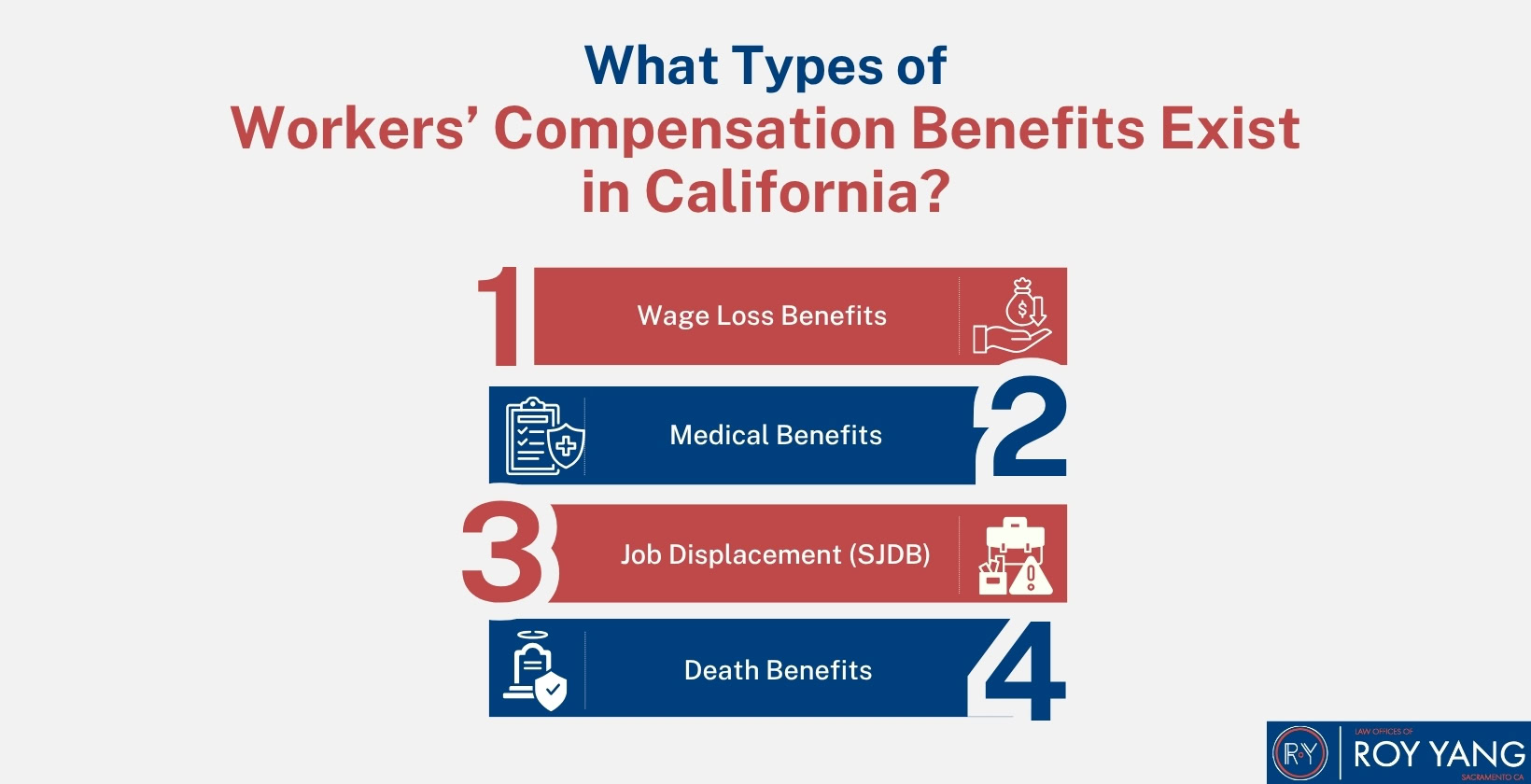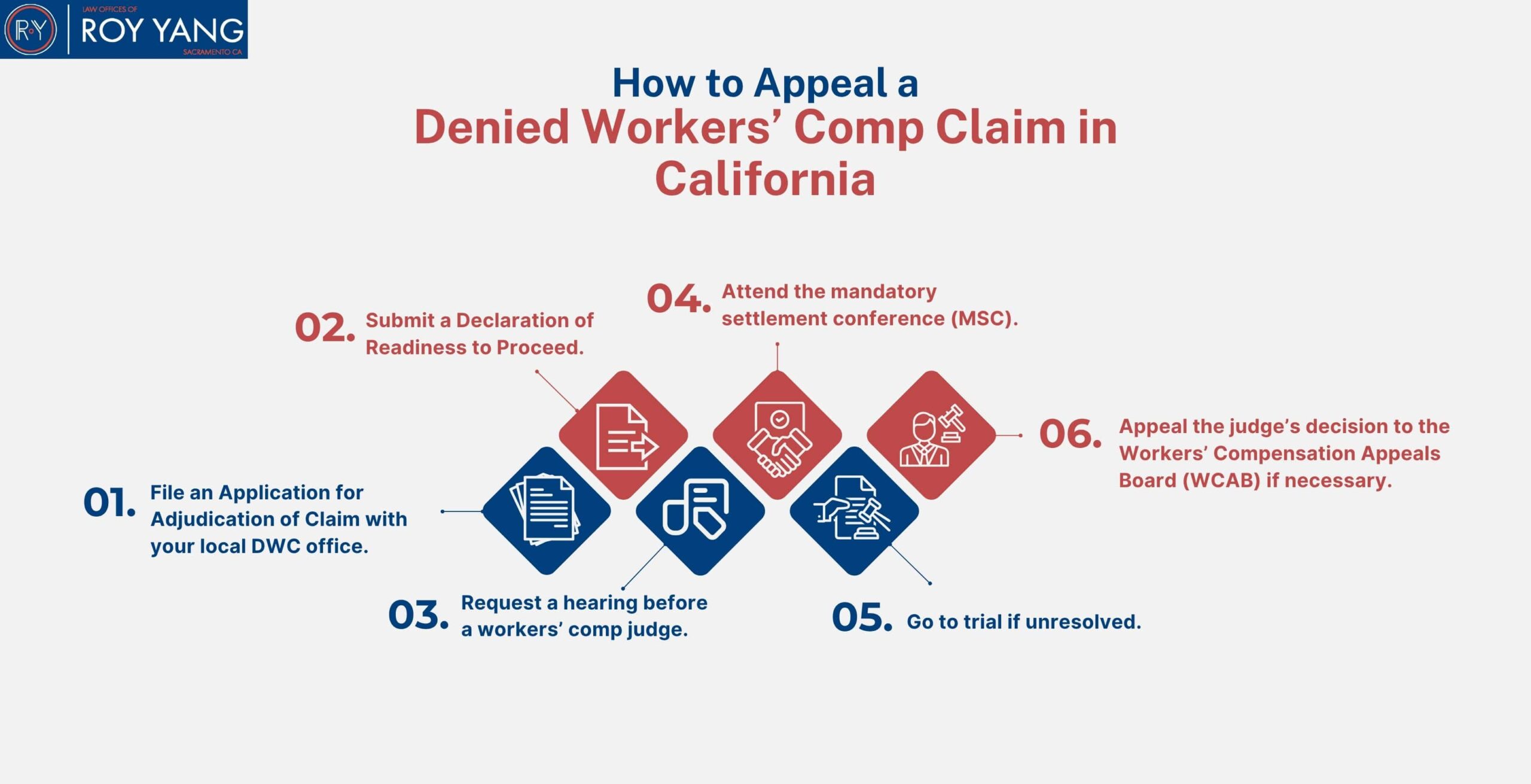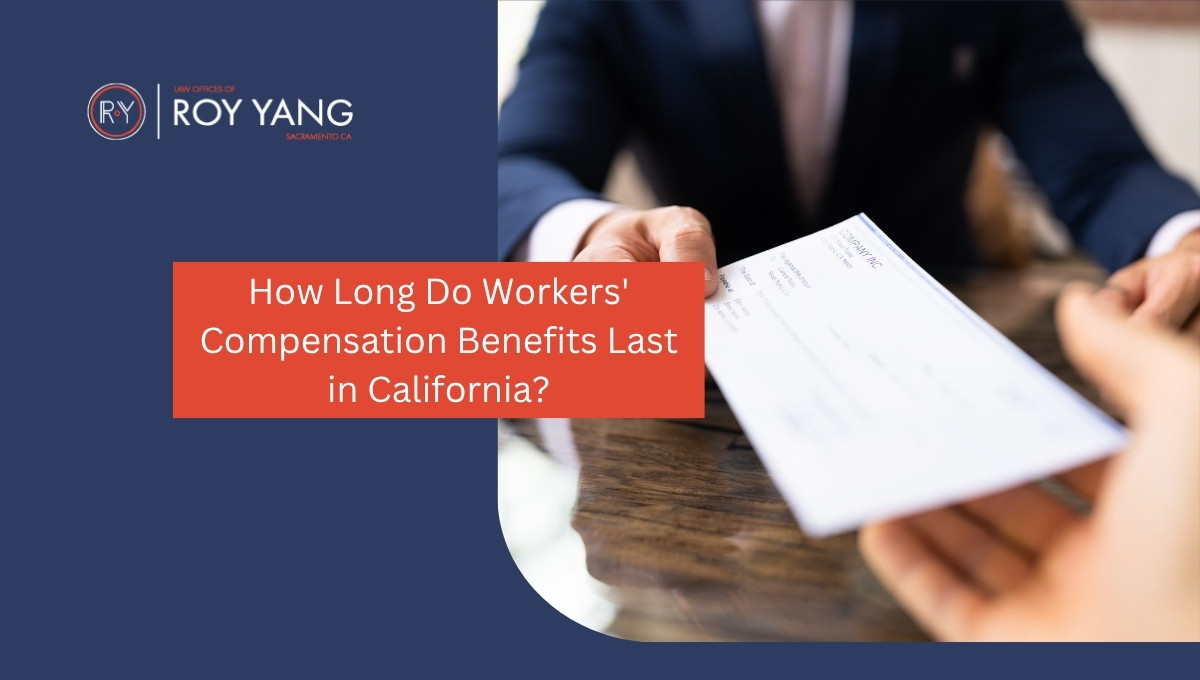How long do workers’ compensation benefits last in California? The answer depends on the nature of your injury, the type of benefits you are receiving, and the expected pace and scale of your recovery progress. Temporary disability benefits typically last up to 104 weeks, but some cases involving serious injuries can extend to 240 weeks. Permanent disability payments and medical care may continue for much longer if your condition requires ongoing support.
If your checks unexpectedly stop or your care is delayed, it is time to consider hiring professional legal help to review your case.
At the Law Offices of Roy Yang, we help injured workers across Northern California understand their benefits, respond to unexpected changes, and move toward appeal, settlement, or permanent disability when appropriate.
Key Takeaways
- Temporary disability benefits in California last up to 104 weeks, or 240 weeks for serious injuries like amputations or burns.
- Permanent disability payments can continue for life, based on your disability rating and medical status.
- Medical care has no time limit if it is pre-approved and tied to your original workplace injury.
- Workers’ comp can end early if you return to work, reach Maximum Medical Improvement (MMI), miss appointments, or accept a settlement.
- You can reopen a claim within 5 years if your condition worsens, but updated medical evidence is required.
How Does California Define Workers’ Compensation Duration?
In California, workers’ compensation duration is determined by the type of benefit involved: temporary disability, permanent disability, or medical care. Each benefit follows a different timeline and set of legal rules:
Temporary Partial Disability (TPD): Duration Limits and Partial Wage Replacement
Temporary Partial Disability (TPD) covers partial wage loss when you return to work with restrictions but still earn less than before. If you are medically cleared to work part-time or in a modified role like clerical tasks, shorter shifts, or avoiding lifting, you may qualify for TPD benefits.
These benefits typically stop if your condition worsens and you can no longer work, or once you return to your regular duties without restrictions.
Temporary Total Disability (TTD): Up to 104 Weeks Within 5 Years
Temporary Total Disability (TTD) benefits pay two-thirds(⅔) of your average weekly wages when your injury prevents you from working at all. In California, you can receive TTD for up to 104 weeks within a five-year period from the date of injury.
The benefit weeks can be used in intervals, depending on your treatment plan and recovery progress. Common reasons for TTD include surgery recovery, bone fractures, or other conditions requiring complete rest. Keep track of how many weeks of benefits you have used; once you hit the 104-week cap, you may need to transition to other available benefits.
Post-TTD Rules: What Happens After 104 Weeks in California
When your Temporary Total Disability (TTD) ends after 104 weeks, your next steps will depend on your medical condition, recovery progress, and ability to return to work:
- Permanent Disability (PD): For lasting impairments after MMI.
State Disability - Insurance (SDI): If PD does not apply, apply for SDI through the California Employment Development Department (EDD).
- Settlement: Lump sum or structured payments.
Return to Work: If medically cleared for light duty. - Extended TTD: Up to 240 weeks for serious injuries.
Example: A worker who suffered spinal damage from a fall in a California warehouse may transition to permanent disability (PD) while considering settlement options.
Permanent Disability Payments: Weekly Benefits Based on Disability Rating
Permanent Disability (PD) benefits start after a doctor confirms you have reached Maximum Medical Improvement (MMI). Your weekly payments depend on your disability rating; the higher the rating, the longer the payments will last. Serious injuries may qualify for lifetime support.
Medical Care: No Time Limit for Authorized, Work-Related Treatment
California workers’ compensation places no time limit on medical care for accepted, work-related injuries. As long as the treatment is medically necessary and pre-approved, workers can continue to receive care, such as surgery, medications, physical therapy, or specialist care like orthopedics or pain management. The treatment must be supported by medical evidence and reviewed regularly by your claims administrator or a Utilization Review (UR) physician.
Which Factors Shorten or Extend Workers' Comp in California?
Several factors affect how long your CA workers’ comp benefits last. These include your injury, medical progress, return-to-work status, and legal decisions.
Type and Severity of Injury
The type and severity of your injury directly affect the length of workers’ compensation benefits. Minor injuries, such as sprains or strains, often resolve within a few weeks. In contrast, serious conditions such as spinal cord damage or severe burns typically lead to long-term or permanent benefits. Higher-severity cases qualify for extended medical care and wage replacement under California law.
Medical Treatment Progress and Maximum Medical Improvement (MMI) Status
Maximum Medical Improvement (MMI) means your condition is stable and unlikely to improve with further treatment. Once you reach MMI (Maximum Medical Improvement), it means your condition is stable. At that point, temporary benefits usually stop, and you may move to permanent disability.
Job Availability and Return-to-Work Timeline
When your employer offers modified work that matches your medical restrictions, temporary disability benefits often stop or shift to partial payments. Your doctor evaluates whether you are cleared for light-duty tasks, such as desk work or monitoring. The return-to-work status directly impacts wage replacement, job reinstatement, and whether you qualify for ongoing partial disability support.
Administrative Decisions or Legal Disputes
Delays, denials, or communication errors from the claims administrator often lead to paused or reduced workers’ compensation benefits. Common disputes include rejected medical treatment, benefit overpayments, or disagreement over your disability rating. These cases typically require a formal appeal through the Division of Workers’ Compensation. Acting quickly with legal guidance can help preserve your claim and maintain your benefit timeline.
Workers’ Compensation Disability Ratings
Your disability rating determines how much you receive and for how long under permanent disability benefits. It is assigned after your doctor confirms you have reached Maximum Medical Improvement (MMI) and reflects the long-term effects of your injury.
How Ratings Are Assigned After MMI
After reaching MMI, your treating physician or a Qualified Medical Evaluator (QME) assigns a percentage rating from 0% to 100%. This score assesses the extent to which your injury restricts your ability to work, considering factors such as age, physical limitations, pain levels, and overall functional capacity.
Why Your Rating Impacts Payment Duration and Amount
Higher ratings result in more weeks of compensation and larger weekly payments. A rating of 70% or higher may qualify you for lifetime disability benefits, while lower ratings may result in limited weekly support.
Why Do Workers’ Compensation Payments End Early in California?
Workers’ compensation benefits in California end early when you reach medical recovery, return to modified work, violate program rules, or settle your work comp case. The exact reason depends on your medical status, job offer, or legal actions taken by the California court of jurisdiction on your case.
Returning to Work
Resuming work in a modified or light-duty role usually ends your temporary wage benefits. If a modified job offer meets your documented restrictions, declining it without a valid reason can end your wage benefits. The insurance company typically stops Temporary Disability (TD) payments once a doctor confirms you can safely perform the duties offered by your employer. Similarly, your eligibility for benefits can be affected if you are terminated, and it’s important to understand how getting fired affects your benefits.
Missing Appointments or Failing to Follow Medical Advice
Skipping medical appointments or not following treatment instructions can result in the immediate suspension of your workers’ compensation benefits. Insurance companies treat non-compliance as a sign that your condition has improved or that you are not cooperating with care. Consistent attendance and medical compliance are crucial for maintaining eligibility for both wage replacement and continued treatment under California law.
How Can Workers’ Comp Be Extended or Reopened in California?
California allows you to reopen a workers’ comp claim if your condition worsens within 5 years of the original injury. A formal petition and updated medical evidence are required to restore benefits or medical care.
Reopening a Claim for Worsening Symptoms
If your condition worsens within 5 years of your injury, you can file a Petition to Reopen. Typical reasons include:
- A new diagnosis related to your original injury.
Increased pain or reduced mobility documented by a doctor. - Recommended surgery or a major change in treatment.
- Regressed recovery after returning to work.
A successful petition restores access to wage loss payments and medical care.
Requesting a QME or IME Review
You can request a QME or IME review if you disagree with your disability rating or Maximum Medical Improvement (MMI) status. A Qualified Medical Evaluator (QME) is a doctor certified by the state medical board of California and assigned by the CA Division of Workers’ Compensation. The employer’s insurer typically arranges an Independent Medical Exam (IME). These evaluations directly impact your eligibility for extended benefits, medical care, and your legal ability to reopen or modify a claim.
Filing a Petition to Reopen Based on New Medical Evidence
To file a Petition to Reopen, you must submit updated medical evidence showing that your condition has worsened. This must be done within 5 years of the original injury. Supporting documents should include detailed reports from your treating physician. The petition is filed with California’s Division of Workers’ Compensation (DWC) and may reinstate benefits.
What Types of Workers’ Compensation Benefits Exist in California?
California workers’ comp includes 4 main benefits:
- Wage Loss Benefits: Covers lost income through:
- TTD (Temporary Total Disability): When you cannot work at all
- TPD (Temporary Partial Disability): When you work with reduced income
- PD (Permanent Disability): Based on lasting impairment after recovery
Medical Benefits: Pays for authorized treatment and mileage from driving to and from appointments
- Medical Benefits: Pays for authorized treatment and mileage from driving to and from appointments
- Job Displacement (SJDB): A voucher for retraining if your employer cannot offer suitable work
- Death Benefits: Support for dependents and funeral costs if a worker dies from job-related injury

How to Respond to Late or Canceled Workers’ Comp Payments
If your California workers’ compensation checks are delayed or suddenly stopped, do not wait, act quickly to protect your income and access to care. There are backup options available depending on your situation, including support through California’s State Disability Insurance (SDI) program.
Using State Disability Insurance (SDI) When Workers’ Comp Ends’
If your workers’ compensation ends and you are still unable to work, you can apply for State Disability Insurance (SDI) through California’s Employment Development Department (EDD). SDI provides short-term wage replacement while you are recovering. You will need a doctor’s certification confirming continued disability. This program is separate from workers’ comp and must be initiated by submitting a claim directly to the EDD.
How to Appeal a Denied Workers’ Comp Claim in California?
To appeal a denied California workers’ comp claim, you must follow a formal process through the Division of Workers’ Compensation (DWC).
- File an Application for Adjudication of Claim with your local DWC office.
- Submit a Declaration of Readiness to Proceed.
- Request a hearing before a workers’ comp judge.
- Attend the mandatory settlement conference (MSC).
- Go to trial if unresolved.
- Appeal the judge’s decision to the Workers’ Compensation Appeals Board (WCAB) if necessary.

What to Do If Initial Checks Are Delayed
If your first California workers’ comp check does not arrive on time, take immediate steps to protect your claim.
- Notify your claims administrator in writing and document the delay.
- Confirm your employer submitted the DWC-1 form.
- Organize all paperwork, including doctor’s reports and correspondence.
- Track the 14-day deadline from the employer’s injury report to the insurer.
- Consider legal recourse: If delays persist, understand when to hire a workers’ comp lawyer and get a legal consultation to resolve the issue and protect your rights.
Contact a Lawyer If You Are Facing Sudden Termination of Benefits
When your workers’ comp checks stop without notice or you have been notified your benefits are ending, speak to a workers’ comp attorney immediately. Sudden terminations may violate California law. A lawyer can review your file, challenge noncompliant decisions, and demand reinstatement when justified. At the Law Offices of Roy Yang, we help injured workers in metro Sacramento and across Northern California protect their rights and hold insurers accountable when benefits end unfairly.
Contact us for a confidential case review, and we will help you understand your options to fight the decision.
FAQs About Workers’ Compensation Duration in California
Can workers’ comp benefits be reinstated after they stop?
Yes, California workers’ comp benefits can be reinstated if your condition worsens and you reopen your claim. You must file a Petition to Reopen with medical evidence within five years of the original injury date. If approved, you may regain access to medical care and wage payments based on your updated disability status.
What happens if I move to another state while on workers’ comp?
If you move out of California, your workers’ comp benefits can continue, but you must notify your claims administrator. You will need to arrange out-of-state medical care that meets California’s approval process. All treatment must still be authorized under California workers’ compensation rules.
How long does workers’ comp insurance have to approve treatment in California?
California workers’ comp insurance must approve or deny treatment within five business days of receiving a valid Request for Authorization (RFA). This timeline starts once the insurer receives the request from your treating physician.
Can I lose my health insurance while on workers' comp in California?
Yes, you can lose your employer-sponsored health insurance while on workers’ comp in California if your employer stops paying premiums. In this case, you may qualify for COBRA continuation coverage or state options like Covered California for temporary insurance replacement.
Do workers’ comp payments go up the longer I’m out of work?
No, workers’ comp payments do not increase the longer you are out of work. Your payment amount is based on your average weekly wage and disability rating. The duration of benefits is governed by medical status, not time away from work.
Can you sue workers' comp for pain and suffering?
No, you cannot sue workers’ comp for pain and suffering. Workers’ compensation only covers medical costs, wage loss, and disability, not pain and suffering.
Can I still receive workers’ comp benefits if I accept a new job?
Yes, you can continue receiving some workers’ comp benefits after accepting a new job. However, wage loss payments may be reduced or stopped depending on your new earnings and job duties.
What is the longest you can be on workers’ comp in California?
In California, the longest you can receive workers’ compensation is for life, which is possible if your injury results in a permanent disability rating of 70% to 100%. For temporary disability benefits that cover lost wages, payments are typically capped at 104 weeks (two years), but can extend to 240 weeks for very severe injuries.
What happens if you are caught committing workers' comp fraud?
Committing workers’ compensation fraud is a serious crime. If convicted, penalties can include paying back all benefits received, significant fines, and even jail time. It is a felony in California and carries long-term consequences.
Need Help? Speak to an Experienced Workers’ Comp Lawyer at the Law Offices of Roy Yang
Even if your workers’ comp benefits have ended or been denied, legal options are still available in California. At the Law Offices of Roy Yang, we help injured workers understand their rights, review complex claims, and pursue the full compensation they are owed. We serve clients in Sacramento, Stockton, Roseville, Folsom, Oakland, and all of Northern California.
Reach out for a free consultation or call on (888) 660-2831 and get clear, timely guidance from a local attorney who listens.



